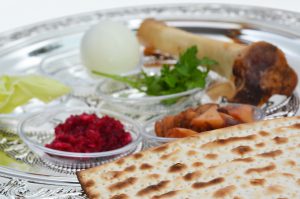To a novice, the notion of baking challah seems very daunting. But there’s nothing like warm, homemade challah to start your Shabbat, and it turns out that once you get the hang of it, it’s really not that hard after all. Tova Younger offers this simple recipe for a dough which she says takes only 15 minutes to prepare.
Ingredients:
5 lb (2 1/2 kilo or 18 cups) flour (bread/hi gluten flour or whole wheat, either way it comes out great!)
2 Tbsp. active dry yeast (no need to proof)
5 tsp. salt
2/3 cup sugar, or 2 Tbsp. sugar and 1/3 cup honey
1 cup oil
6 cups warm water (tip: combine 5 cups of room temperature water with 1 cup of boiling water)
Kneading Your Dough
Use a large bowl and work at a table rather than at a counter; it’s a more comfortable height. Combine all dry ingredients. Stir for half a minute and add liquids. Mix with a strong, large spoon until it’s too difficult; finish kneading by hand. Do not squeeze dough as it will ruin the texture. Just keep punching and turning it over. If you are a beginner, be patient and persevere. After a few times, you won’t believe how quick and simple it is!
If the dough is very sticky, add a bit of flour. If that doesn’t help, add a bit of oil. Too much flour will make it heavy. Too dry? Add a bit of water at a time, or again, some oil. Once it becomes a dough with a nice feel and appearance, you are finished!
Let It Rise
Cover the dough by inserting the entire bowl into a fresh garbage bag. Let rise for about an hour, until double in bulk. You may let it rise for a longer period of time, but not too much as it will develop a yeasty taste.
The Mitzvah of Challah
Now you’re ready to do hafrashas challah, the special mitzvah, commandment, of separating a piece of dough. In the times of the Temple, this piece was given to a kohen, a member of the priestly family, to enjoy. Today, we burn this piece instead. While standing and with your right hand, pinch off a small piece of the dough without detaching it. Ashkenazim recite the blessing “lihafrish challah (min ha-eesah)” and Sephardim recite the blessing “lihafrish challah terumah.” Separate the piece of dough you are holding in your right hand; some people say “harei zu challah.” Wrap the piece well and burn completely (you can do this in the oven, but not while other bread is baking.)
The mitzvah of Challah is considered to be special for women, but men are also obligated in it. Like all of Jewish law, there are many more details than this and you should be in touch with a qualified Orthodox rabbi with any questions. You can read more about this mitzvah here or here.
Forming and Baking Your Challahs
Punch down the risen dough and divide into four equal parts. Each part can make either two medium-sized challahs or 12-16 small rolls. Braid (more on this shortly) and brush with one egg yolk mixed with one tablespoon of water. Sprinkle with sesame or poppy seeds.
When the braiding is almost completed, preheat the oven to 325F. Wait five minutes, turn off the oven; let challahs rise in the hot oven and they will be ready to bake in about ten minutes. Bake at 350F for 45 minutes; rolls need only 30 minutes. (Baking time will vary according to your oven so watch carefully the first few times.) If you will be transferring challah hot, use a pillowcase instead of a plastic bag.
Back to Braiding: How to?
You can make a standard braid with three strands, but you’ll get a more impressive creation with six strands. Here’s one way of making a six-rope braid:
Connect six ropes of dough at one end. Grasp the two rightmost ropes, one in each hand. Swing both hands toward the left, dropping the rope in your right hand to the middle of the four ropes on the table. Your left hand continues holding its rope. With the now-empty right hand, pick up the leftmost rope. Swing both hands back toward the right, dropping the rope in your left hand to the middle of the four ropes on the table. Your right hand continues holding its rope. With your left hand, pick up the rightmost rope, swing back toward the left. Continue swinging and dropping back and forth. Pinch the ropes together at the end when done, tuck under a bit if desired. This is easier than it sounds and comes out beautiful.
If that was way too complicated for you, try this easy four-strand method: With four ropes of dough connected at the top, take one of the rightmost rope and go over and under and over the other three. Repeat with the next rope, which is now the outer one on the right side. Continue in this fashion until the entire challah is braided.
For pretty rolls, you can simply make a rope and knot it. If you bring the bottom end up through the little hold formed by the knot, it looks even nicer.
Tip!
These challahs can be frozen and pulled out later and warmed up for a fresh-out-of-the-oven taste.
Now that you’ve learned how to bake challah, go ahead and make this mitzvah yours! You won’t be disappointed!



Shoshana
says:Can the recipe for the challah be halved or reduced? If so, are there any changes to be made?
Helen
says:Please do not put food into new/clean garbage bags. They are treated with toxic chemicals during the manufacturing process. I simply use wax paper or plastic food wrap.
Tzivia
says:I tried the recipe with all the tips, and it came out delicious! I just added 4 egg yolks and put half the oil, because I was also wandering about the eggs. The tips were a great help. Thanks!
Rachel
says:I would like to know as well about adding eggs?
admin
says:I’ve written to Tova Younger to ask her about that. As she lives in Israel, it may be a while before she replies, but I will post her reply as soon as I can. Thanks!
Esther
says:I have a very similar recipe that also doesn’t call for eggs & it is absolutly fabulous. so go ahead & enjoy!
Good shabbos!
Chana
says:Great details, but shouldn’t there be at least 2 eggs ? I really got in the challa baking mood !
admin
says:Tova Younger’s reply:
That is true. I always used to manage with one, and one day my neighbor brought me 3 egg yokes and asked if I could use them – I did and saw a difference! So really it could be 1,2 or 3 depends on how brown/shiny you want your challis to be!